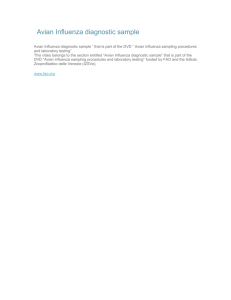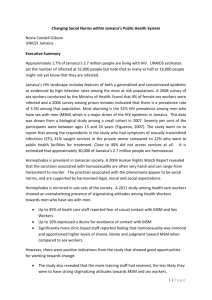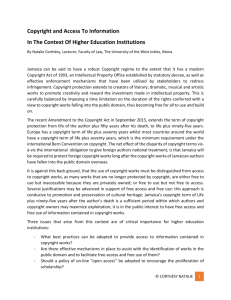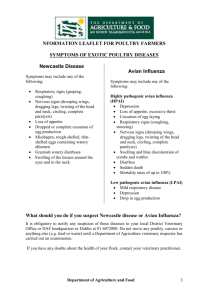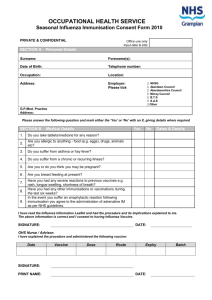World Health Organization
advertisement
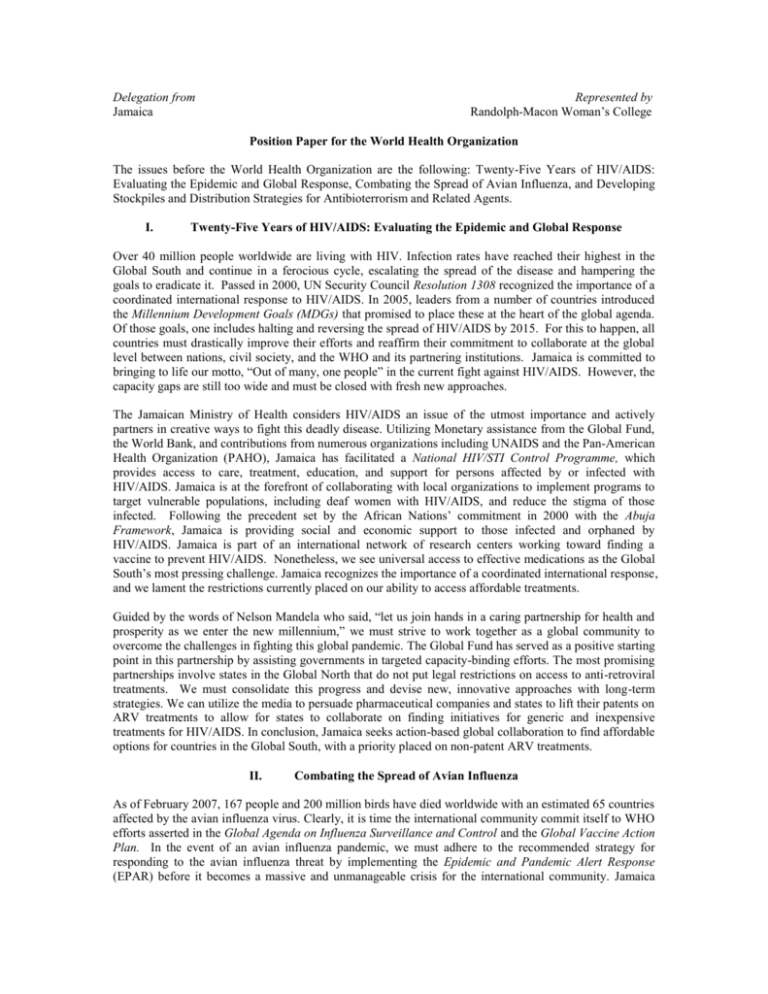
Delegation from Jamaica Represented by Randolph-Macon Woman’s College Position Paper for the World Health Organization The issues before the World Health Organization are the following: Twenty-Five Years of HIV/AIDS: Evaluating the Epidemic and Global Response, Combating the Spread of Avian Influenza, and Developing Stockpiles and Distribution Strategies for Antibioterrorism and Related Agents. I. Twenty-Five Years of HIV/AIDS: Evaluating the Epidemic and Global Response Over 40 million people worldwide are living with HIV. Infection rates have reached their highest in the Global South and continue in a ferocious cycle, escalating the spread of the disease and hampering the goals to eradicate it. Passed in 2000, UN Security Council Resolution 1308 recognized the importance of a coordinated international response to HIV/AIDS. In 2005, leaders from a number of countries introduced the Millennium Development Goals (MDGs) that promised to place these at the heart of the global agenda. Of those goals, one includes halting and reversing the spread of HIV/AIDS by 2015. For this to happen, all countries must drastically improve their efforts and reaffirm their commitment to collaborate at the global level between nations, civil society, and the WHO and its partnering institutions. Jamaica is committed to bringing to life our motto, “Out of many, one people” in the current fight against HIV/AIDS. However, the capacity gaps are still too wide and must be closed with fresh new approaches. The Jamaican Ministry of Health considers HIV/AIDS an issue of the utmost importance and actively partners in creative ways to fight this deadly disease. Utilizing Monetary assistance from the Global Fund, the World Bank, and contributions from numerous organizations including UNAIDS and the Pan-American Health Organization (PAHO), Jamaica has facilitated a National HIV/STI Control Programme, which provides access to care, treatment, education, and support for persons affected by or infected with HIV/AIDS. Jamaica is at the forefront of collaborating with local organizations to implement programs to target vulnerable populations, including deaf women with HIV/AIDS, and reduce the stigma of those infected. Following the precedent set by the African Nations’ commitment in 2000 with the Abuja Framework, Jamaica is providing social and economic support to those infected and orphaned by HIV/AIDS. Jamaica is part of an international network of research centers working toward finding a vaccine to prevent HIV/AIDS. Nonetheless, we see universal access to effective medications as the Global South’s most pressing challenge. Jamaica recognizes the importance of a coordinated international response, and we lament the restrictions currently placed on our ability to access affordable treatments. Guided by the words of Nelson Mandela who said, “let us join hands in a caring partnership for health and prosperity as we enter the new millennium,” we must strive to work together as a global community to overcome the challenges in fighting this global pandemic. The Global Fund has served as a positive starting point in this partnership by assisting governments in targeted capacity-binding efforts. The most promising partnerships involve states in the Global North that do not put legal restrictions on access to anti-retroviral treatments. We must consolidate this progress and devise new, innovative approaches with long-term strategies. We can utilize the media to persuade pharmaceutical companies and states to lift their patents on ARV treatments to allow for states to collaborate on finding initiatives for generic and inexpensive treatments for HIV/AIDS. In conclusion, Jamaica seeks action-based global collaboration to find affordable options for countries in the Global South, with a priority placed on non-patent ARV treatments. II. Combating the Spread of Avian Influenza As of February 2007, 167 people and 200 million birds have died worldwide with an estimated 65 countries affected by the avian influenza virus. Clearly, it is time the international community commit itself to WHO efforts asserted in the Global Agenda on Influenza Surveillance and Control and the Global Vaccine Action Plan. In the event of an avian influenza pandemic, we must adhere to the recommended strategy for responding to the avian influenza threat by implementing the Epidemic and Pandemic Alert Response (EPAR) before it becomes a massive and unmanageable crisis for the international community. Jamaica feels that an increase in funds to partnering organizations and states is essential so that all member states will have affordable access to vaccine stockpiles and the means to distribute these vaccines. Recognizing that weaknesses in early detection and rapid response have greatly contributed to the spread of diseases of animal origin, Jamaica is enthusiastic about the implementation of the Global Early Warning System. It is a national priority to reduce the threat that avian influenza poses to our poultry industry, as an avian influenza pandemic would be catastrophic, potentially leading to the death of up to seven million chickens and the loss of 30,000 jobs. To this end, Jamaica has already conducted a real-time simulation called “Operation Poultry” to ensure our ability to handle an outbreak of avian influenza on the island. Jamaica encourages all member states to do the same by taking preventative measures against this threat to our economic health and food security. Stockpiling necessary vaccines is another essential preventative measure. Jamaica endorses the MDG Targets 17 and 18 to close the influenza vaccine supply gap by partnering with other member states as well as pharmaceutical companies to make essential drugs affordable. The PAHO Revolving Fund for Vaccine Procurement is a prime example of a collaborative effort which has made great strides in making these vaccines affordable in our region. A critical element to focus on is goal eight of the MDGs which aims to develop a global partnership for development that will encourage pharmaceutical companies to provide worldwide access to essential vaccines at affordable prices. Jamaica believes that, once the economic market to avian influenza vaccines becomes open to healthy competition, the demand for larger stockpile supplies will increase, the supply by pharmaceutical companies will increase, and prices for partnering states will drop. In conclusion, Jamaica firmly believes that member states must strive toward global cooperation in preparedness for an avian influenza pandemic by collaborating with and providing incentives to pharmaceutical companies for research and development as well as fair and preemptive access to a much-needed vaccine. III. Developing Stockpiles and Distribution Strategies for Antibioterrorism and Related Agents Bioterrorism is a growing transnational which and threatens international security. This issue was addressed in the Geneva Protocol of 1925, which made biological weapons illegal, and was revisited in the 1972 Biological Weapons Convention, which restricted the use of biomedicine to peaceful means only. Review Conferences are occurring every five to six years to assess the comprehensiveness of the BWC in relation to new developments. Jamaica steadfastly believes in adherence to these sources of law which promote national security and protect against potential biological threats. We stand ready to help our hemispheric partner who experienced the deadly effects of terrorism only six short years ago to secure our region from this other, yet equally deadly, form of terrorist violence; we know the international community is committed to the same. Jamaica supports partnering with other nations to obtain the highest standards of national and human security. Jamaica aligns itself with the international community through UN Security Council Resolutions 1373, 1540 and 1673 which address the issue of the proliferation of weapons of mass destruction (WMDs), and put into place a system of review to ensure that states are in compliance with these resolutions. Jamaica also complies with the Guiding Principles for International Outbreak Alert and Response, and the Global Outbreak Alert Response Network as laid out by the WHO to improve the coordination of international assistance supporting local efforts, and to build on new and existing partnerships within the global network. Additionally, we are actively engaged with the Global Health Security Epidemic Alert and Response to detect potential bioterrorist threats at an early stage and initiate an immediate, coordinated response. The scope of this threat transcends boundaries and directly affects the security of all nations. It is crucial that we develop distribution strategies for vaccine stockpiles in all countries and implement detection and response systems to enhance global security. We look to UN Security Council Resolutions 1373, 1540, and 1673 to reaffirm commitments made by member states to combat this threat. We see great promise in collective adherence to the recommendations of Former Secretary General Kofi Annan’s High Level Panel on Threats, Challenges and Change, which recognizes the interconnectedness of associated threats and the need for concerted action. In conclusion, to avert bioterrorist attacks, all member states should work toward enacting legislation to ban the trafficking of WMDs, as well as develop vaccine stockpiles to minimize casualties should an attack occur.
